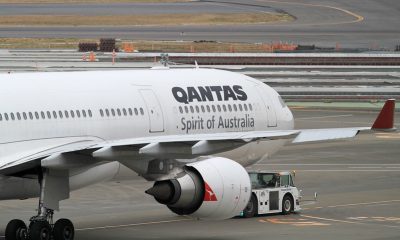American News
Analysis: Trump, in China, opts against confrontation

Secretary of State Rex Tillerson said later that Trump’s comment had been “a little bit tongue-in-cheek” but that it nonetheless carried “a lot of truth.” (Photo: Donald J. Trump/Facebook)
BEIJING— President Donald Trump pulled his punches.
On the home turf of the rising superpower he once declared was “raping” the United States on trade, Trump on Thursday abandoned his often-pugnacious posture.
He opted instead for public flattery and deference and chose to denounce past U.S. presidents for the economic imbalance. And while he urged China to do more to pressure North Korea to abandon its burgeoning nuclear weapons program, the vibe was more conciliatory than confrontational.
Trump, who made China’s growing economic might a bogeymen during his presidential campaign, appeared set to deliver a face-to-face scolding of President Xi Jinping following an announcement of new business deals between U.S. and Chinese companies.
Standing just a few feet away from the Chinese president, Trump declared that the two nations “must immediately address the unfair trade practices” that drive the trade deficit, along with barriers to market access, forced technology transfers and intellectual property theft.
“But I don’t blame China,” Trump said to audible gasps from some of the business leaders and journalists from both countries in The Great Hall of the People.
“After all, who can blame a country for being able to take advantage of another country for the benefit of its citizens?” he asked, to cheers from some of the Chinese contingent. “I give China great credit.”
Secretary of State Rex Tillerson said later that Trump’s comment had been “a little bit tongue-in-cheek” but that it nonetheless carried “a lot of truth.”
Either way, it was a far cry from Trump’s inflammatory campaign rhetoric on China. Night after night at rallies across the country, he portrayed himself as a hard-nosed negotiator who would hold other countries accountable for disadvantaging American workers.
“We can’t continue to allow China to rape our country and that’s what they’re doing,” he said in Indiana in May 2016. “It’s the greatest theft in the history of the world.”
While Trump made clear that he wanted a more equitable trade relationship, he made no mention of previous campaign threats to label China a currency manipulator, impose double-digit tariffs or authorize draconian trade measures.
Trump took a similarly softer tack on rising tensions with North Korea, whose nuclear capability he has labeled “a threat to civilization.”
Before arriving in Beijing, Trump had delivered a stern message to Xi, using an address in South Korea to call on China, North Korea’s biggest trade partner, to do more to confront and isolate the renegade nation.
But Trump took a gentler tone here, thanking Xi for his efforts and saying he’d been encouraged by his conversations.
“China can fix this problem easily. And quickly. And I am calling on China and your great president to hopefully work on it very hard,” he said.
Tillerson said that while the U.S. and China agreed on the objective in North Korea, the leaders’ private talks explored questions over “tactics and the timing and how far to go with pressure.”
While China is increasingly disenchanted with North Korea’s nuclear weapons development, it remains wary of using its full economic leverage over its traditional ally. China fears triggering a collapse of the North’s totalitarian regime that could cause an influx of refugees into northeastern China and culminate in a U.S.-allied unified Korea on its border.
Trump’s softer approach can be read as a good strategy to coax more co-operation from the Chinese or the absence of a coherent strategy.
“One of Trump’s most successful campaign arguments was that China was taking our jobs and eating our lunch,” said Andrew Nathan, political science professor at Columbia University. “But we’re seeing that Trump doesn’t really have a strategy when dealing with China.”
Dennis Wilder, formerly the CIA’s deputy assistant director for East Asia and the Pacific, said it could be a smart approach.
“I’m certain the president was far more candid and direct in private on trade and Korea. Establishing the personal ties has been important in U.S.-China relations ever since Mao (Zedong) and (Richard) Nixon,” he said, referring to the landmark 1972 meeting in China that paved the way for normalization of relations between Washington and Beijing.
Bonnie Glaser, a China expert at the Center for Strategic and International Studies, said Trump’s apparent strategy “is to flatter Xi and praise the Chinese people, hoping to build enough good will to produce positive outcomes down the road.”
She was skeptical it would work, saying China would comply more fully with U.N. sanctions on North Korea, but is unlikely to cut crude oil supplies. Glaser was even less optimistic that China would address U.S. concerns on “predatory” trade practices. She predicted more U.S. cases against China at the World Trade Organization in the coming months, and revision of rules for national security screening of foreign investment by China and other nations in the U.S.
This is not the first time that Trump, the tough-talking dealmaker, shied away from confrontation in a foreign capital.
In Saudi Arabia in May, he made no mention of the country’s history of human rights abuses and declined to utter the phrase “radical Islamic terror,” the use of which he had previously declared a necessity, during a speech to Arab leaders.
He has offered muted criticism of Russian President Vladimir Putin for the country’s interference in the 2016 elections. And the White House has indicated that Trump, when in the Philippines later this trip, was unlikely to publicly chide its president, Rodrigo Duterte, for overseeing a drug war with extrajudicial killings.
One time Trump did publicly upbraid his hosts was his spring visit to the gleaming new NATO headquarters in Brussels. Trump rebuked heads of state, who represent some of the United States’ oldest European allies, for not paying enough for defence and he refused to explicitly endorse the organization’s mutual defence pact.





















